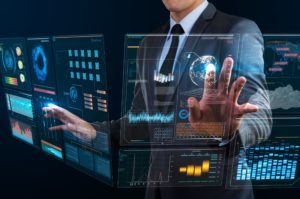Last updated on April 4th, 2024 at 11:14 am
Introduction about how Deep Learning differs from traditional Machine Learning
Deep learning is a subset of machine learning in which artificial neural networks, algorithms inspired by the brain, learn from large amounts of data. Deep learning is used to recognize patterns in data, such as images or spoken words, and make predictions based on those patterns.
Traditional machine learning algorithms are designed to work with a small amount of data and require humans to hand-label that data. Deep learning algorithms can automatically label data by finding patterns in the data itself. This allows deep learning to work with much larger datasets and achieve better results than traditional machine learning.
Key concepts and components of Deep Learning:

Deep learning is a subset of machine learning that uses algorithms to model high-level abstractions in data. In deep learning, a set of algorithms attempt to learn representations of data that are more complex than the input data.
The key concepts and components of deep learning are:
- Algorithms: Deep learning algorithms are designed to learn high-level data representations. These algorithms are usually based on neural networks composed of many interconnected processing nodes or neurons.
- Neural networks: Neural networks are the building blocks of deep learning architectures. They are composed of many interconnected processing nodes or neurons that can learn to recognize input data patterns.
- Representations: Deep learning algorithms learn complex representations of data that are more informative than the raw input data. These representations can be used for classification, prediction, and estimation tasks.
Types of Deep Neural Networks used in Deep Learning and Applications of Deep Learning.
Many different types of neural networks are used in deep learning, each with advantages and applications. The most popular types of neural networks used in deep understanding are convolutional neural networks (CNNs) and recurrent neural networks (RNNs).
CNNs are well-suited for image classification and recognition tasks, as they can learn to extract features from images and identify patterns. RNNs are good at sequential tasks such as text generation and machine translation, as they can remember information from previous inputs.
Deep learning can be applied to many tasks, such as image classification, object detection, speech recognition, machine translation, and natural language processing.
Why Make a career in Deep Learning and Data Analytics?
There are many reasons to make a career in deep learning and data analytics. With the ever-growing amount of data being generated, the need for experts who can analyze and make sense of it will only increase. Deep learning and data analytics offer a unique set of skills that can be used to uncover hidden patterns and trends, which can then be used to make better decisions or predictions.
The ability to work with large amounts of data and extract useful information from it is highly valued in today’s business world. Deep learning and data analytics provide the tools and techniques to do this effectively. As more organizations strive to become data-driven, the demand for deep learning and data analytics experts will only grow.
So, if you’re looking for a challenging and rewarding career that offers the opportunity to make a real impact, deep learning, and data analytics is worth considering.
Learn and Grow with Imarticus Learning:
Imarticus Learning is offering a job interview guarantee program for recent graduates and professionals who want to develop a successful data science and analytics career. This program will take you through the practical aspects of data science and analytics, allowing you to gain practical knowledge about the implications of data science in real-world businesses, preparing you to work as a data science professional in an emerging field of data science and analytics.
During the data analytics course, you will build a data science project from scratch, applying the learnings from our boot camps. This is how you learn how to plan and implement a project successfully, get valuable feedback from the evaluators, and add it to your GitHub portfolio.
We offer various career services to help you find the right job. Our resume development, profile enhancement, mentorship, and interview preparation workshops are designed to help you land your dream job.
Professional Scope: What Can I Become after the Data Analytics certification course?
- Data Scientist
- Data Analyst
- Business Analyst
- Business Intelligence Specialist
- Business Analytics Professional
- Analytics Manager
- Data Science Consultant
- Machine Learning Engineer
Course USPs:
- Job interview Guarantee
- Job-Specific Curriculum
- Live Learning Module
- Real-world Projects
- Dedicated Career Services
- KPMG India COE Organised Hackathons

